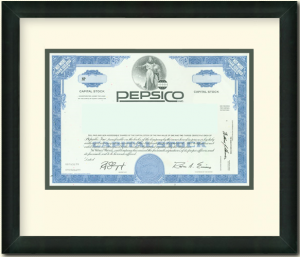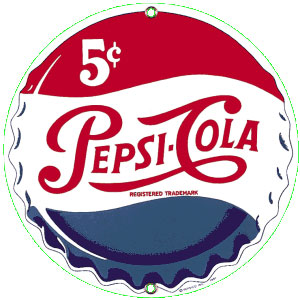How My Grandpa Dennis Could Have Turned His Pepsi Habit Into a 7-Figure Estate
 I’ve written in the past about how nearly every American alive today has been confronted with perhaps a dozen different companies that they knew first hand because they enjoyed using the firm’s products for years (in some cases, their whole life) that turned out to be spectacular investments. Yet, they never thought to research the business and consider becoming an owner.
I’ve written in the past about how nearly every American alive today has been confronted with perhaps a dozen different companies that they knew first hand because they enjoyed using the firm’s products for years (in some cases, their whole life) that turned out to be spectacular investments. Yet, they never thought to research the business and consider becoming an owner.
One of the things I think about a few times a year is my paternal grandfather’s Pepsi habit. My dad’s side of the family, which grew up just outside of San Francisco, joked that no one made breakfast for Dennis (my grandfather) because “he could open his own Pepsi”.
Over the past 60+ years, Pepsi has been one of the best investments in the world. With dividends reinvested, it has compounded at somewhere between 13% and 15% annually, depending upon the period. If we go on the low end of that figure, say 13.5%, it is interesting to see how much money they could have had by simply investing in, and owning, a product that they knew, understood, and used. They saw Dennis drink, and enjoy, this product every day of their lives. There was a rule in the house that no one drank the last Pepsi, which should be a fairly good indication of the emotional power the brand had with its consumers.
Imagine that in 1950, my dad’s family had created an investment company – let’s call it Kennon Beverage Holdings, Inc. – for the sole purpose of investing in Pepsi stock.
Each week, they contributed $10 to the company, which it used to purchase additional shares of Pepsi. They reinvest their dividends and never increase their savings rate (meaning that even today, they would still be kicking in only $10 each week among all of the family members – so about $1.50 each per week). Kennon Beverage Holdings itself has only a few shares; each time a new child is born, they issue a single share of stock to him or her.
What the Kennon Family Business Would Look Like Today

Had they done this, today, Kennon Beverage Holdings, Inc. would have eight shares of stock outstanding and each family member would own one of these shares (e.g., one would be owned by Kathryn, one by Sharon (Dennis’ widow, to whom he was remarried for decades), and one by each of the kids: Danny, Eddie, Paul, Mark, Kimmy, and Dave).
This family business would have the simplest balance sheet and income statement in the world:
- It would show a single asset of 117,713 shares of Pepsi with a market value of roughly $7,677,242.
- The company would generate more than $211,883 in cash dividends each year.
The family would have three options during its shareholder meeting each Christmas:
- They could pay the taxes owed on the cash dividends and reinvest the net back into additional shares of Pepsi stock for future growth.
- They could distribute all of the cash dividends to the shareholders so they could live on the money. If there were eight shares outstanding of Kennon Beverage Holdings, Inc., each held by a family member, each investor would receive a check for $26,485.38 every Christmas and be responsible for paying the 15% or so dividend tax that was due.
- They could liquidate the company and distribute the Pepsi stock to each stockholder of Kennon Beverage Holdings, Inc. Each of the eight stockholders would receive $959,655.25 worth of Pepsi shares that they could either continue to hold or sell for cash.
All for $10 a week. That is how powerful long periods of time can be when you are thinking about compounding. Can you imagine if they had kicked in $20 a week and bought Coca-Cola stock in addition to the Pepsi investment?
This is one of the reasons that 80-90% of millionaires in the United States are self-made with only 10-20% coming from inheritance. If you know how compounding works, it is simple to get rich. The problem is, schools don’t teach this stuff (even though it just basic algebra) and you are unlikely to learn it unless you were born into the small percentage of financially savvy families in the country.
What To Take Away From This …
A lot of people reading this will say, “Yeah, that’s nice … too bad it didn’t happen.” They probably will move on, never thinking about it again. The point is: What are you doing in your life right now – today – to make sure that your family is in the favorable position 40, 50+ years from now?
—
Image Credit for Vintage PepsiCo Caps in Top Banner: emka74 / Shutterstock.com


